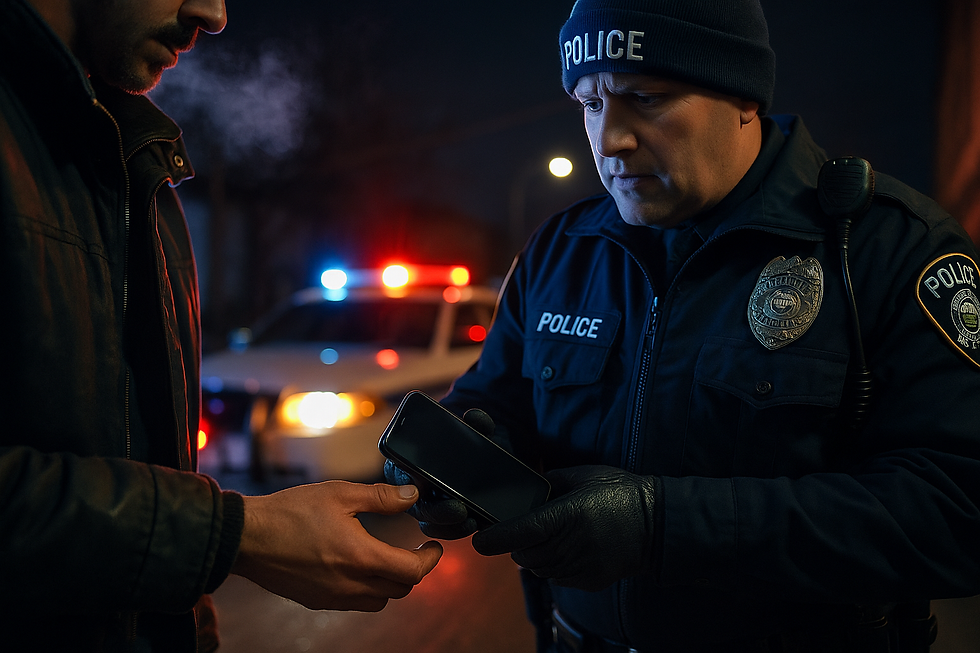Can the Police Lie to You During an Interrogation in ND?
- Heartland

- Sep 2, 2025
- 4 min read

Police Deception in North Dakota: What You Need to Know
One of the most common questions people ask after being arrested is: “Can the police legally lie to me during an interrogation in ND?” The short answer in North Dakota is yes. Police officers are allowed to use deceptive tactics during questioning to try to get you to confess or provide incriminating information.
That might sound shocking—but it is a reality you need to understand if you’re facing questioning in Bismarck, Minot, Fargo, Williston, Dickinson, or anywhere in North Dakota.
What the Law Says About the Police being able to lie during an interrogation in ND
The U.S. Supreme Court has ruled that police deception during interrogations is generally legal. This applies nationwide, including in North Dakota. For example, officers might:
Claim they have evidence that doesn’t exist (like DNA, fingerprints, or surveillance footage).
Tell you that a co-defendant has already confessed, even if they haven’t.
Suggest that cooperation will lead to leniency, even though only prosecutors and judges—not police—can decide that.
This means you cannot assume that everything said in the interrogation room is true.

How North Dakota Courts Handle Police Lies
In North Dakota, courts generally allow police deception unless it becomes so extreme that it makes a confession involuntary. The key test is whether the suspect’s will was overborne.
For example:
A false claim about fingerprints may be allowed.
But if officers threaten violence, promise guaranteed release, or coerce a suspect in a way that shocks the conscience, a judge may suppress the confession.
Cases in Burleigh County (Bismarck), Ward County (Minot), and Cass County (Fargo) have all involved disputes over whether an interrogation tactic crossed the line.
Your Rights During an Interrogation
Even though police may lie, you still have strong rights under the U.S. Constitution and the North Dakota Constitution.
Right to Remain Silent – You do not have to answer questions. If you say, “I want to remain silent,” questioning must stop.
Right to an Attorney – You can request a lawyer at any time. Once you do, police cannot continue questioning you without your lawyer present.
Miranda Warnings – If you are in custody, officers must read you your rights before interrogation. If they fail to do so, your statements may be inadmissible.
Why Talking to Police Without a Lawyer is Risky
Many people think they can “explain their side” to clear things up. But in reality:
Anything you say can be twisted or misinterpreted.
Police may already suspect you and are looking for confirmation.
Even innocent people have been pressured into false confessions.
In places like Bismarck, Minot, or Fargo, once you’re in an interrogation room, the odds are stacked against you. Having a criminal defense attorney changes that balance.
What to Do If You’re Questioned by Police in North Dakota

If you are approached or arrested:
Stay calm and polite – Do not argue or resist.
Do not answer questions – Clearly state, “I am invoking my right to remain silent.”
Ask for an attorney immediately – Say, “I want to speak to my lawyer.”
Do not be tricked – Remember, officers can legally lie. Don’t let their tactics pressure you.
Call Heartland Law Office – With nearly 20 years of experience, we protect clients across North Dakota, from Grand Forks to Williston.
Conclusion
Yes—police can lie to you during an interrogation in North Dakota. But you don’t have to fall for it. The most powerful step you can take is to remain silent and call a criminal defense attorney immediately. At Heartland Law Office, we defend clients in Burleigh, Ward, Cass, Stark, and Williams counties, and across tribal and state courts.
Internal Links
For more information on protecting your rights, check out these related Heartland Law Office blogs:
External Sources
FAQ: Police Lies and Interrogations in North Dakota
Q: Can police lie about evidence in North Dakota?
A: Yes. Police can legally claim they have fingerprints, DNA, or video evidence even if it doesn’t exist.
Q: Do I have to talk to police if I’m arrested in Bismarck or Fargo?
A: No. You have the right to remain silent anywhere in North Dakota.
Q: What if police don’t read me my rights?
A: If you were in custody and not read your rights, your statements may be excluded from court.
Q: Can asking for a lawyer make me look guilty?
A: No. It is your constitutional right. Judges and juries cannot assume guilt from requesting an attorney.
Q: What should I do if I’m being interrogated in Minot or Grand Forks?
A: Politely refuse to answer questions and call an experienced North Dakota criminal defense lawyer right away.
This article is for informational purposes only and does not constitute legal advice. Always consult with a licensed attorney regarding your specific situation.





